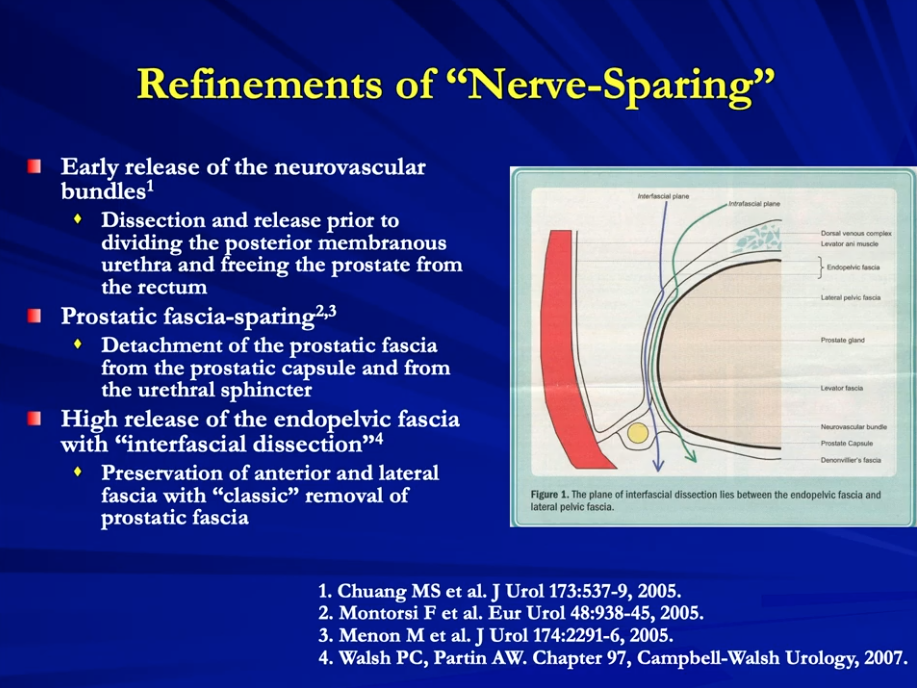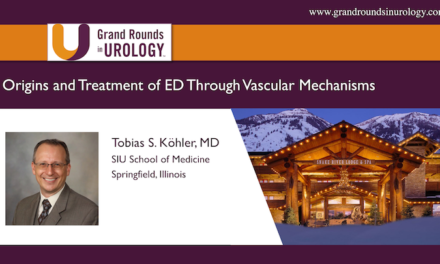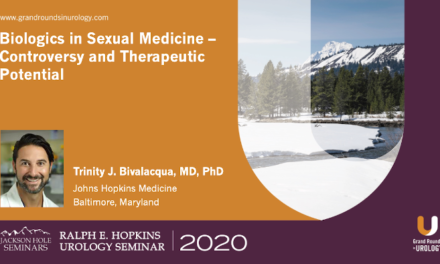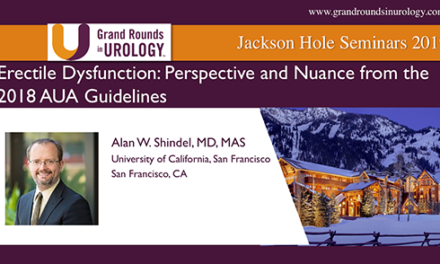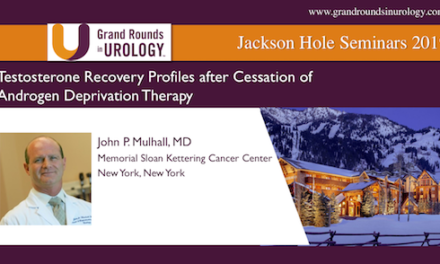Arthur L. Burnett II, MD, MBA, FACS, presented “New Frontiers in Cavernous Nerve Restorative Therapy to Preserve Erectile Function after Radical Prostatectomy” during the Jackson Hole Seminars on January 31, 2019 in Jackson Hole, Wyoming.
How to cite: Burnett II, Arthur L. “New Frontiers in Cavernous Nerve Restorative Therapy to Preserve Erectile Function after Radical Prostatectomy” January 31, 2019. Accessed [date today]. https://new-frontiers-in-cavernous-nerve-restorative-therapy-to-preserve-erectile-function-after-radical-prostatectomy/
New Frontiers in Cavernous Nerve Restorative Therapy to Preserve Erectile Function after Radical Prostatectomy – Summary
Arthur L. Burnett II, MD, MBA, FACS, presents the rationale for invoking therapeutic strategies for enhancing erectile function recovery following radical prostatectomy. He assesses possible therapeutic strategies that target the cavernous nerve in order to restoring erectile function and identifies the requirements and future possibilities for penile rehabilitation success.
Abstract:
While radical prostatectomy (RP) does offer excellent long-term rates of prostate cancer control, erectile dysfunction (ED) remains a significant complication of the surgery. Although cavernous nerve-sparing techniques have reduced ED to 15-40%, there remains an interest in and a need to improve erectile function recovery rates. Patients may still experience neuropathy despite nerve-sparing surgery due to other factors, including factors on the molecular and genetic levels.
In regard to the current state of managing RP-related ED, there have been refinements in nerve-sparing techniques, including early release of the neurovascular bundles, prostatic fascia-sparing, and high release of the endopelvic fascia with “interfascial dissection.”
Previously, the paradigm of managing ED involved a process of care with patients progressing from first- to third-line therapies based on degrees of invasiveness, ranging from oral PDE5 inhibitors to penile prosthesis surgery. Now, the American Urological Association (AUA) has described a shared decision-making model in which all options can be a potential first-line treatment depending upon the scenario and preferences of the patient. Although PDE5 inhibitors may be successful in the context of treatment on demand to achieve an erection response, data is inconclusive regarding their efficacy in rehabilitating natural, spontaneous erections.
There are still limited options physicians can offer to meet patient expectations of recovery rates due to lack of level 1 evidence-based medicine. However, there are efforts being made to achieve optimal functional outcomes following RP. These efforts include investigations into agents with potential benefit for neuroprotection, especially erythropoietin, nerve regeneration strategies, and electric stimulation of the cavernous nerve.
In the future, it is imperative that we continue rigorous scientific investigation, including the conduction of controlled clinical trials, in order to improve future progress.
About the Ralph E. Hopkins Urology Seminar
The Ralph E. Hopkins Urology Seminar, or Jackson Hole Seminars (JHS), is a multi-day conference that focuses on patient safety and cutting-edge updates in the assessment, diagnosis, and treatment of urologic conditions. The topics discussed include urologic cancers, stone disease, urologic reconstruction, female urology, infertility, emerging surgical techniques, and general urology. In addition to didactic expert lectures, this conference features a unique interactive critique panel. Dr. Burnett presented this lecture during the 39th Annual JHS. Please visit this page in order to register for future JHS meetings.
ABOUT THE AUTHOR
Arthur L. Burnett II, MD, MBA, FACS, is a Professor in the Department of Urology and Director of the Basic Science Laboratory in Neuro-Urology at Johns Hopkins University School of Medicine. His professional appointments at the Johns Hopkins Hospital include Director of the Male Consultation Clinic and Clinician-Scientist at the James Buchanan Brady Urological Institute. Dr. Burnett earned his undergraduate degree in biology from Princeton University and his medical degree at Johns Hopkins University School of Medicine. He completed his internship and residency in surgery and, subsequently, residency and fellowship in urology at the Johns Hopkins Hospital. After completing his urology residency, Dr. Burnett received an American Foundation of Urologic Disease New Investigator Award to continue research into the regulatory mechanisms of penile erection. Since then, he has maintained an active laboratory in neuro-urology.
Dr. Burnett is recognized as a world-authority in the science and medicine of male erectile dysfunction. He has contributed original discoveries about the nitric oxide biochemical mechanisms in erectile tissue that have paved the way for the clinical development of oral medications to treat erectile dysfunction. He has also done pioneering work developing therapies to protect the penile nerve function required for improved erectile function recovery after radical prostatectomy.
Dr. Burnett has written more than 150 original peer-reviewed articles, along with numerous additional articles, editorials, and book chapters, relating to his biomedical research and clinical activities. His work has appeared in many major journals including Science, Nature Medicine, Proceedings of the National Academy of Sciences, Journal of Urology, Urology, and Journal of Andrology. He is a Fellow of the American College of Surgeons, as well as a member of the American Urological Association, the Sexual Medicine Society of North America, the International Society for Sexual Medicine, the Society of Genitourinary Reconstructive Surgeons, the Society for Urodynamics and Female Urology, and the Society of Black Academic Surgeons. He has sat on various advisory committees, including the Urology Study Section, the National Institutes of Health Center for Scientific Review, and the FDA Advisory Committee for Reproductive Health Drugs.

